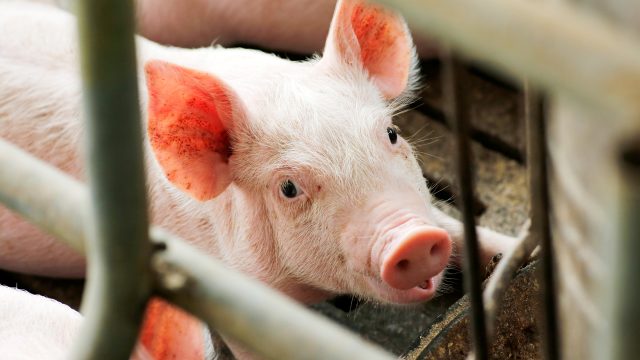
REPORT: FDA Should Improve Food Labels That Leave Consumers Confused About Allergens and Animal Ingredients
New report reveals that current labeling regulations put consumers at risk and fail to comply with federal law.
Contact: media@aldf.org
SAN FRANCISCO — The Animal Legal Defense Fund released a report showing that consumers care about what goes into the food products they purchase but are not able to accurately discern whether a product contains animal-derived ingredients based on current U.S. Food and Drug Administration (FDA) labeling requirements. The study revealed that a simple disclaimer for animal-derived ingredients added to food labels would significantly help consumer understanding and safeguard health, while bringing the FDA into compliance with their Congressional mandate and previously stated policy goals.
Results from the report include:
- 90 percent of respondents value knowing what ingredients are in their food.
- 61 percent value knowing whether a product contains animal-derived ingredients.
- 47 percent would be upset to learn that a food they did not expect to contain animal-derived ingredients does contain animal-derived ingredients.
- 64 percent are confident that current ingredient lists contain all the information needed to determine whether a product has animal-derived ingredients.
- The rate of correctly identifying a product that contained animal-derived ingredients jumped from 21 percent to 95 percent when shown an ingredients list with a disclaimer.
- The rate of correctly identifying a product that contained animal-derived ingredients jumped from 14 percent to 86 percent when shown a product whose principal display panel (PDP) bore a disclaimer.
- 71 percent can identify individual plant-based ingredients when shown a list to choose from.
- 28 percent can identify individual animal-derived ingredients when shown a list to choose from.
Under current food labeling requirements, consumers cannot discern whether a product contains animal ingredients. For example, L-cysteine is made from duck feathers and appears as a dough-softening ingredient in bagels, cookies, breads, and pies. Other ingredients can be either animal- or plant-derived, but the sourcing of ingredients is not currently required to be disclosed on product labels. For example, omega-3 fatty acids are often sourced from fish, monoglycerides are commonly sourced from animal fats, and vitamins A and D3 are sometimes sourced from lanolin, a grease found in sheep’s wool.
Whether a food product contains animal-derived ingredients is a material fact. For religious, moral, food safety, and allergen concerns, consumers have a significant interest in the disclosure of animal-derived ingredients. The report confirmed that a majority of respondents value knowing whether a product contains animal-derived ingredients. The difference between products that contain animals and those that do not is a material difference in type. For example, to someone with alpha-gal syndrome — an allergy that can cause anaphylactic shock after exposure to even trace amounts of mammal-derived ingredients — it matters a great deal whether a product contains animal-derived ingredients that could trigger an allergic reaction. Similarly, to someone who cannot consume foods that come from cows for religious reasons, there is a very real difference between a food product that uses cow-derived gelatin versus plant-derived gelatin. The physical ingredients being used are different, and that matters to consumers.
“Confusion about whether there are animal-derived ingredients in products can be life-threatening to consumers and impede their ability to make informed decisions that align with their values,” says Animal Legal Defense Fund Managing Attorney Amanda Howell. “It is the FDA’s responsibility to ensure products are labeled clearly rather than having consumers chase down information that may or may not be accurate.”
The report confirmed that disclaimers can help consumers identify whether there are animal-derived ingredients in their food. In the report, respondents were randomly given ingredient lists with or without a “contains animal-derived ingredients” disclaimer along with the other allergens. Correct identification of such ingredients rose from 5.6 percent to 96.7 percent for WinCo Bagels, from 3.3 percent to 96.3 percent for General Mills’ Apple Cinnamon Cheerios, and from 30.8 percent to 93.5 percent for Planter’s Dry Roasted Peanuts. These dramatic leaps in accuracy show that under current labeling laws, the vast majority of consumers are unable to accurately detect animal-derived ingredients even after inspecting the PDP and ingredients list — and that adding a disclaimer is highly effective at bridging this asymmetrical information gap.
The “Contains Animal-Derived Ingredients” study was conducted by researchers at the University of Oklahoma and completed in April 2024.
The report is available upon request.
Focus Area
Related
-
Rhode Island Governor Signs Cat Declaw Ban into Law
Declawing is an invasive surgical procedure to remove the last bone in a cat's toesJuly 2, 2025 News -
U.S. Supreme Court Declines Review of California’s Landmark Proposition 12 Animal Cruelty Law
The Animal Legal Defense Fund helps protect the strongest farmed animal protection law in the countryJuly 2, 2025 News -
OCTOPUS Act Reintroduced in the U.S. Senate
The federal bill would prevent the industry from gaining traction by banning commercial octopus farming in the U.S.June 5, 2025 Press Release
Sign Up!
Join the Animal Legal Defense Fund's email list to stay up to date on lawsuits, legislation, and regulations affecting animals.




